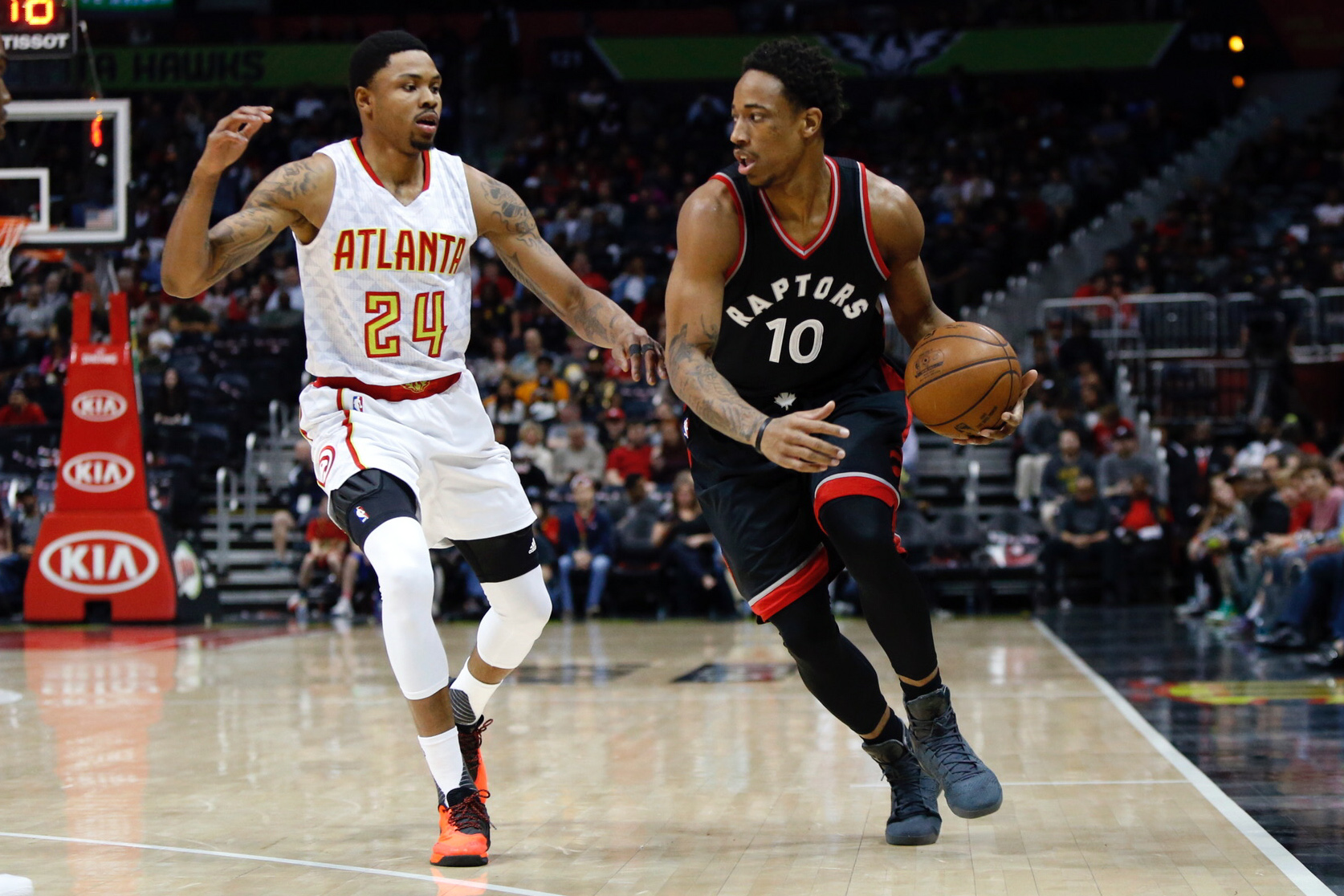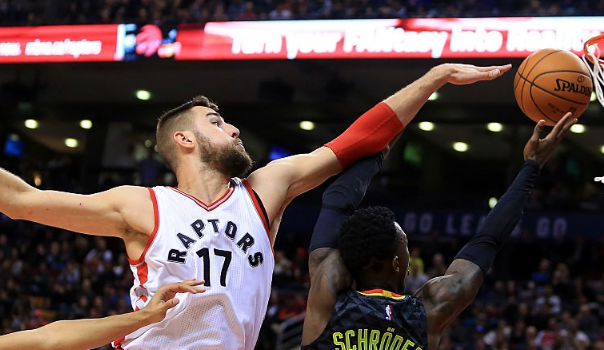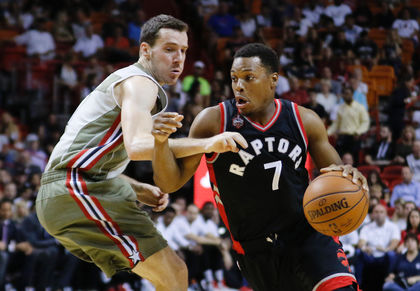Raptors 99, Hawks 105 | Box Score | Quick Reaction | Reaction Podcast
The Toronto Raptors are playing with a very thin margin for error right now.
This is not news. It is not a revelation. It is not some grand analytic finding or journalistic discovery. They are a team built to win on the backs of a pair of dominant All-Stars, and even with two substantial trade deadline acquisitions, winning without one of those pillars is going to be exceedingly difficult. It’s been written plenty now: With Kyle Lowry on the shelf, the Raptors need DeMar DeRozan to be terrific, they need role players to step up beyond what’s normally asked of them, and they need to try like hell on defense.
Sometimes, even doing most of that won’t be good enough. The formula right now is fickle, and any ingredient falling just a little too short or coming in just a little too heavy is liable to throw the entire balance off. And so it went on Friday in Atlanta, where the Raptors dropped a 105-99 decision to the Hawks that was within two possessions for 46 minutes, that the Raptors very much could have won, and that swung on a number of elements teetering at the margins.
DeRozan’s play through three quarters was magnificent, firmly enough to carry his part of the bargain. In the first quarter, DeRozan flipped heavy defensive attention against the Hawks, working in facilitator mode and dishing three of his six assists. The Raptors flashed a few small wrinkles in the sets they normally use to get him post-ups or on the move, and it opened up some space for teammates, who probably did DeRozan’s assist number a disservice with shaky shooting. Even with DeRozan distributing, the offense was bogged down against Atlanta’s near-elite defense, so DeRozan shifted back into attack mode. Entering the fourth, he had shot 10-of-20, but his jumper abandoned him late, with too many late-clock scenarios requiring him to hoist mediocre looks (he took eight threes on the night, about five more than he should take in any given game). Those shots were needed from him, and he was great the bulk of the night, but it wasn’t there in the closing minutes.
All told, DeRozan had a strong two-way performance, but there was nobody to pick up the slack when DeRozan’s scoring hit the skids. Late in the fourth quarter, the Raptors went five minutes scoring just four points, and it was only then that the Hawks were able to open up the game’s first lead greater than four points. The game went from an 86-86 tie at the 5:58 mark to a 98-90 Hawks lead with 1:01 to go, and given how the offense was flowing for the Raptors, an eight-point deficit seemed mostly insurmountable.
To their credit, they kept fighting, pressuring the ball for turnovers and scoring quickly in transition. But the fouling game in the closing seconds is what it is, and Atlanta’s decision to remove Dwight Howard in response to the Raptors removing Jonas Valanciunas – curious decisions on both sides, particularly since Valanciunas was effective in this one (even alongside Serge Ibaka for a third consecutive game) and there was no certainty the Hawks would match small – precluded Toronto to moving to a hack-a-Howard strategy. The Raptors may have taken Howard out of the game, but doing so required them to remove their best defensive rebounder and their best means of chopping Hawks’ possessions down to inefficient free-throw trips.
That decision was somewhat justified given how things have gone of late. Dwane Casey has found a comfort level with a closing five that downsizes in the frontcourt and opens up switching options across the floor. It was a gamble while Howard was in the game, but when Mike Budenholzer matched small, it looked like a fine call. (There’s room to quibble – Norman Powell was the team’s best bench player and outplayed DeMarre Carroll and P.J. Tucker but sat late, and Valanciunas had a case – but there’s a case for the strategy they used, too.)
What Casey couldn’t have predicted was another one of the weird events that happen at the margins and swing much-too-tight games: Ersan Ilyasova making a key defensive play. As Tucker hit a three of unspeakable importance given the game situation, Ibaka was whistled for his sixth foul thanks to an Ilyasova sell that falls somewhere between Shawn Michaels and Ric Flair. The Ed Malloy-led referee crew bought it, hook, line, and sinker, like they were a gaggle of Earl Hebners, and Ibaka was fouled out. To be clear, Ibaka was guilty of an infraction, but given how the game had been called to that point (inconsistently, but with a lot of leeway for clutching and grabbing), and given that Ilyasova would get called for what appeared to be a makeup whistle not long after, it was a tough one to swallow. Even worse, there was an even more egregious call on Ibaka moments prior, when he turned away a Paul Millsap shot cleanly, only for Millsap to wind up at the line. (Eric Koreen passes along that the locker room was especially displeased with that one.)
When your room for error is small, introducing Ed Malloy into the mix is rarely a positive.
It’s in games like this that it is at the same time much easier to point to things like inconsistent officiating as a root cause in the loss and missing the point to do so. It’s understandable, especially on a game-changing play like the Ibaka-Ilyasova call. The reality is, that could have shifted the outcome. It could have. But the counter to that, one the coaching staff would almost surely echo (though they did not in the immediate aftermath of the game), is that the Raptors didn’t need to be in that position, anyway. They shot a woeful 4-of-25 on threes, and even if DeRozan’s are excluded out of necessity, they were 3-of-17. They simply missed a lot of looks they needed to make, and the bench can’t go 0-fer from long-range, especially when Carroll joins them. Delon Wright had a shaky night, too, which really limited second units, though they held serve without DeRozan early in the fourth. The Raptors turned 16 offensive rebounds into just 18 points. It goes on.
It was one of those nights where there were a number of things to lament, and had the outcome flipped as the ball hit a pebble at some butterfly effect moment earlier in the game, the Hawks would likely be lamenting those same things, having squandered a magnificent Millsap performance. But it didn’t, and so the Raptors are left to pull hairs over Malloy, over a tough fourth on the offensive end, and over a buffet of missed opportunities, both to come back or take control of the game earlier on.
They’re also left to look at the standings and wonder what kind of significance this game may hold later. A win would have put the Raptors four games up on the Hawks and given them the tiebreaker, essentially a five-game cushion. Instead, they’re just two up and are on the wrong side of the tiebreaker, slightly less assured of securing home-court advantage in the first round of the playoffs. There’s little time to rue that outcome, though. Miami awaits on Saturday, the second night of a back-to-back against a very hungry team that rarely let’s an opponent sleep. The Raptors were reminded Friday that even when they play somewhat well, success is tenuous against quality teams as they’re currently constructed. They’ll need to ply that lesson immediately to return home having produced a winning record on this five-game road trip.



